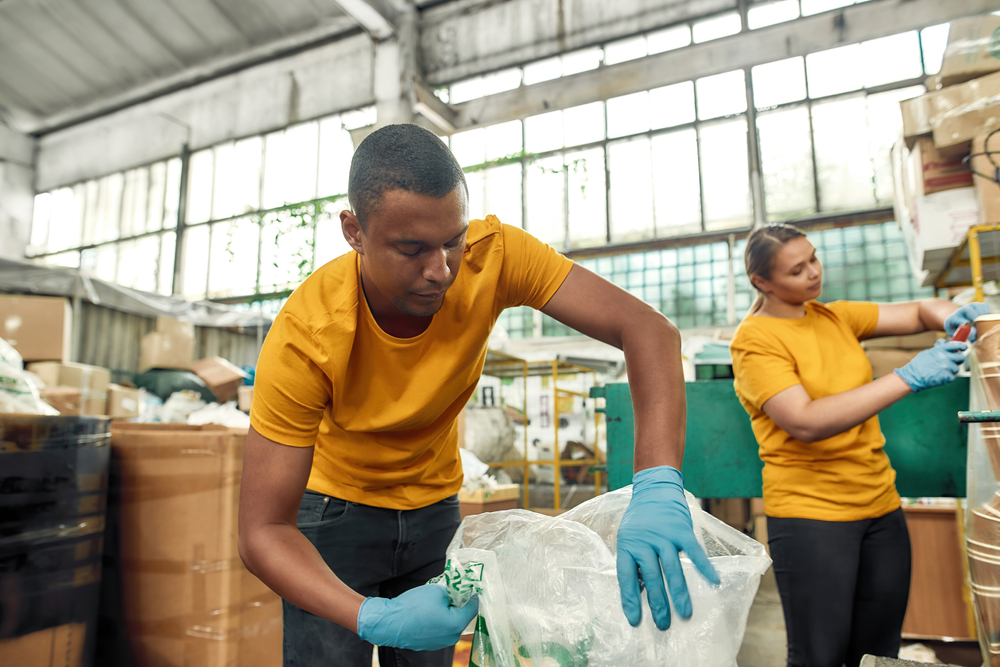Confronting the reality of inequitable access to recycling
Will investing in research, infrastructure and training improve the system? Read More

Image via Shutterstock/BAZA Production
This article originally appeared in our Circularity Weekly newsletter. Subscribe here.
Many systems in place today can be seen as microcosms of our larger world. Therefore, they’re affected by the same social issues people have to deal with in their daily lives — poverty, gender inequality, racial disparities, to name a few.
Waste and recycling in the United States is one such system.
Four in 10 single-family residents in the U.S. lack equitable recycling access, according to The Recycling Partnership’s 2021 “Paying It Forward” report. And for people who live in a multifamily property or rural community, those numbers change to seven in 10.
That data is one reason The Recycling Partnership officially launched its Recycling Inclusion Fund this week. It’s aimed at addressing racial disparities and systemic challenges in the U.S. waste and recycling industries.
When Jessica Levine, founder of the fund, joined The Recycling Partnership in October 2018, she started to think about the opportunity the organization had to support communities at the local level.
“I started to really ask myself the questions looking from an external view and internal view: What does real representation in this space look like? What does equity look like? And from an equality standpoint, what is our organization doing to drive change?” she said.
Levine noted that the organization had already worked toward empowering residents at the local level with the resources and tools that they needed to feel confident and excited about actively participating in local recycling programs.
“But there was this equity piece, from my perspective, that was still missing,” added Levine, who also serves as The Recycling Partnership’s diversity and inclusion manager and was an Emerging Leader at GreenBiz 21.
“If we don’t provide [communities] with resources that really meet them where they are, then how can they really participate in a way that matters most to them, that is significant to them?”
That’s where the Recycling Inclusion Fund, which has raised an undisclosed amount of cash, comes in.
The fund will direct funds to efforts that focus on three key focus areas:
- Research to identify the state of recycling access and participation, barriers and needs in Black, Indigenous and people of color (BIPOC) communities across the U.S.
- Infrastructure and education improvements to reach and empower BIPOC populations with recycling access and resources that meet their needs.
- Leadership and training opportunities in the sustainability sector granted through The Recycling Partnership for recent BIPOC college graduates.
“This partnership helps us to continue to care for the BIPOC communities we serve, while providing access and education to the resources needed to create a sustainable and healthy lifestyle for all,” said Meredith Lindvall, director of recycling and waste diversion at broadband company Cox Enterprises, which contributed to the fund.
The other six funding partners are 3M, Arconic Foundation, The Coca-Cola Company, Kroger’s Zero Hunger Zero Waste Foundation, Procter & Gamble and TAZO.
In a sense, The Recycling Partnership is continuing its role as a connector with this fund, bringing together its corporate partners and community partners. Levine explained that its community partners who are interested in the fund will work with its community engagement team to identify specific opportunities for financial and technical support.
The Recycling Partnership isn’t the only organization thinking about embedding equity into U.S. waste and recycling systems. In its National Recycling Strategy proposed in November, the U.S. Environmental Protection Agency noted that it will “integrate equity and environmental justice principles and priorities into all aspects” of implementing the strategy.













